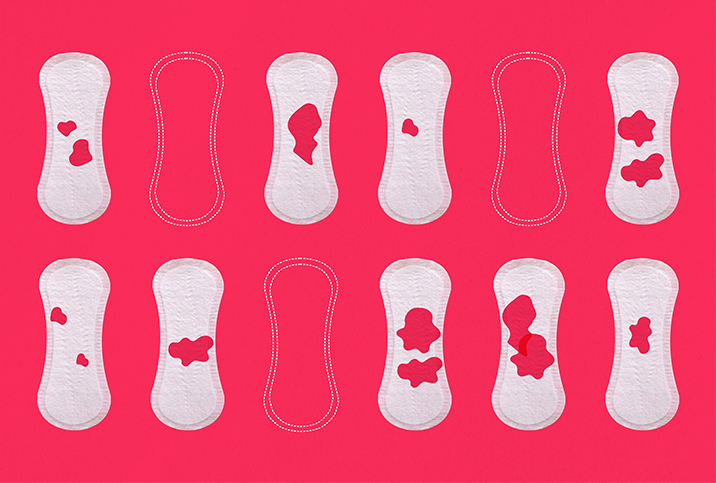Why Are More Girls Hitting Puberty Earlier?

The first signs of puberty have historically been seen in young girls around ages 10 to 13, but in recent decades, puberty has been hitting young girls earlier in age. A 1997 study was the first large-scale research into the phenomenon and looked at data for 17,077 girls ages 3 through 12. The study indicated that girls were reaching puberty milestones, such as breast development, pubic hair development and menstruation, earlier than previous norms.
Since then, various other studies have confirmed what the 1997 study suggested. Experts talk about rising obesity rates, environmental concerns and other potential factors, but does anyone know the truth? We talked to experts to find out.
Breaking down the puberty norms
First, it's important to know that puberty and overall childhood development is not a one-size-fits-all experience.
"Puberty is complex—we don't understand everything about it yet—and as a parent myself, I know that can be frustrating," said Soumya Adhikari, M.D., a pediatric endocrinologist and an associate professor at University of Texas Southwestern Medical Center in Dallas. "Above and beyond general understandings of what causes puberty to start when, I can't emphasize enough that what is normal for one girl might not be normal for another."
There is a "typical" range for girls, however.
"For girls, puberty usually begins between the ages of 8 and 13," said Sonja O'Leary, M.D., a pediatrician at Denver Health Pediatrics. "According to healthychildren.org, this means progressive breast development, growth acceleration and menses, or periods, usually two to three years after the appearance of breasts. Since the 1970s, the age girls experience puberty has dropped three months per decade."
And it's not just girls. While the research has been less robust for boys, puberty is coming earlier for all children. A 2012 study published in the journal Pediatrics indicated that young boys are reaching pubertal characteristics, such as pubic hair growth and testicle growth, six months to two years earlier than in previous decades.
Obesity and early puberty
One oft-cited explanation for early puberty is the growing obesity rates. The most recent research from the Centers for Disease Control and Prevention (CDC) states that 19.7 percent of children ages 2 to 19 in the United States are obese, which accounts for 14.7 million children and adolescents.
Some research has been done on the connection between obesity and early puberty, but not enough information is known at this time to make a definitive connection.
"Numerous studies have shown children who are obese have a higher likelihood of experiencing puberty earlier than expected, but it is not cut and dry," O'Leary confirmed.
The association between obesity rates and early puberty is centered around body fat and the hormones created through fat cells.
"Higher body fat content is associated with earlier onset of puberty, in general," Adhikari said. "Although this is well-supported by the evidence, the mechanisms behind this are only just beginning to be understood. Among other factors, for example, certain hormones in our body which are markers of adequate stores of nutrition, such as leptin, seem central to the activation of the pathways in our body which promote the onset of puberty."
"The more fat cells a body has, the more leptin it will produce, and the thought is that this leptin production is stimulating puberty," added Jana Abelovska, M.Pharm., a superintendent pharmacist at Click Pharmacy, an online pharmacy based in London.
Higher body weight may correlate to earlier menstruation but later breast development, according to a 2021 study published in the Journal of Clinical Endocrinology & Metabolism. This study had similar results to earlier research, finding that Black and Hispanic girls reached puberty earlier than non-Hispanic white girls.
Endocrine disruptors
Another theory to explain early puberty lies in endocrine-disrupting chemicals (EDCs), which can interfere with the production or function of the natural hormones in our body.
"Endocrine-disrupting chemicals have been found to interfere with hormone signaling and are linked to increased obesity rates as well as early puberty," O'Leary said.
EDCs are nearly everywhere, found in our environment through the air, soil and water supply, as well as in various products such as cosmetics, hair products, plastic bottles and pesticides, O'Leary said.
"Children tend to have high levels of exposure to these EDCs as they are commonly found in children's toys and teethers," Abelovska added.
However, more research on the association is needed.
"The most recent reviews looking into whether EDCs in our body are contributing to earlier pubertal onset are inconclusive," Adhikari said. "Many of these chemicals have very short time periods during which they are measurable in our body, so coming to conclusions about what effect they may be having is very challenging. But there is animal data suggesting that there are many reasons why EDCs may be playing a role in pubertal timing."
Stress and early puberty
Understanding the connection between stress and early puberty is complicated. A 2003 study indicated that stressful family relationships may contribute to an early onset of puberty, and a 2012 study suggested that sexual abuse can cause early menstruation.
"Stress is such an individual variable," Adhikari emphasized. "Are there data suggesting an association between things which we might identify as 'stressful'—socioeconomic status, non-intact households, etcetera—and earlier onset of puberty? Yes. But are those independent factors or are they associations because those are also contributing to higher risk of obesity and other risk factors known to be associated with puberty starting earlier? We don't have a definitive answer to this."
Besides, some research in carp and mice actually points to the opposite conclusion, with stress delaying puberty as opposed to rushing it.
"This is due to stress causing the hypothalamic-pituitary-adrenal axis to become maladaptive," Abelovska said. "The HPA axis refers to the interaction between the hypothalamus, pituitary gland and adrenal glands, therefore, any disruption to these interactions will result in a negative impact on most developmental factors, including puberty."
While more research is needed on the connection between stress and puberty, the association is likely multifactorial, O'Leary said, meaning stress may be just one of a number of factors influencing childhood development.
Understanding your child's development
As a parent, you want nothing more than for your children to be healthy and happy, and worrying about your child's development (on top of worrying about everything else) can be overwhelming. But you're not alone, and if you have any questions or concerns, your doctor is there to support you.
"Whilst a parent's first instinct may be to start to panic if they notice their child seems to be entering puberty at a young age, it's important to remember that this isn't uncommon and it's not the fault of anyone or anything in particular," Abelovska said.
If your child shows signs of puberty before the age of 8, you should have them examined by a doctor just in case of any underlying conditions.
"However, in the majority of cases, there is no underlying cause," Abelovska emphasized.
Most cases of early puberty do not come with any risks, but there are situations in which early puberty may lead to thyroid disorders, abnormal brain structure and mental health issues, according to Duke Health.
Conversations with pediatricians and, potentially, child therapists are important to healthy development.
"Even more important to me than general conversations about puberty is emphasizing that every young girl is their own person, and pediatricians are incredibly well positioned and capable of having individual conversations with parents—and with children themselves—to provide counseling about whether their own individual development is progressing as expected or not," Adhikari said.


















